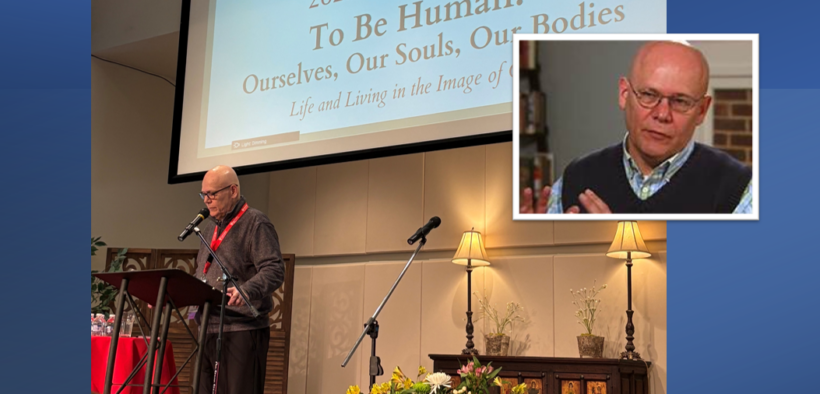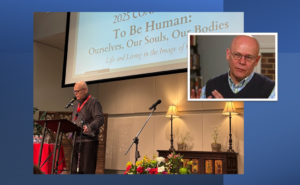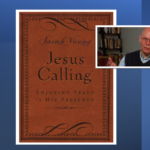EDITOR’S NOTEBOOK: The Triumph of Sentimentality and the Recovery of Christian Realism

EDITOR’S NOTEBOOK: Last Friday (Feb. 28) MinistryWatch President Warren Smith delivered a plenary session speech to the “To Be Human” conference hosted by St. Luke’s Anglican Church at Hilton Head Island, South Carolina. Below is the text of that speech. 
I would like to begin by asking a question. That question is simple, and one that you might have thought about.
What’s the biggest problem facing America, the church, and the world today?
We could probably spend the rest of the hour filling a whiteboard with answers. A few I can think of immediately are: the breakdown of the family, the tribalism of our culture and politics, abortion, the rise of gender ideologies such as homosexuality and transgenderism, the damaging effect of social media, pornography. This list could get very long, very fast.
However, over the course of the next few minutes we have together, I am going to argue that these problems are symptoms, not causes. They are fruit and not root of our current malaise.
So what is the real problem? At the risk of stealing my own thunder, and of proposing an answer that – without some context and actual case-making might seem unlikely — I am submitting for your consideration today that the root problem we face is what I have been calling for the past few years the “Triumph of Sentimentality.”
To put this matter in slightly more technical terms, I think the biggest problem we face today is the abandonment of a Biblical ontology, or Biblical Realism, and the challenge we face is the recovery of a Christian Realism in all areas of life.
Now, one of the proofs I will offer that we live in an age of ontological incoherence is the fact that words no longer mean anything, or – rather – they can mean anything. We live in a cultural moment in which, I am fond of saying, we use the same vocabulary, but we use different dictionaries.
We see evidence of this in the transgender movement, when fundamental, biological reality seems to play no role, or only a slight role, in whether we call someone a man or a woman. Words like “LOVE” and “FREEDOM” have been co-opted by ideologues and often bear no resemblance to a biblical definition of these words.
But I am, in some ways, getting ahead of myself. I think it is only fair that I define some of the terms I have already used and will continue to use during my time with you today.
ONTOLOGY: The branch of metaphysics dealing with the nature of being. In other words: What is real, and what is not?
SENTIMENTALITY: A construct or vision of the world as we would like it to be, rather than as it really is.
Does Scripture Warn Against Sentimentality?
Now, you might be asking: If sentimentality is such a threat, if the affirmation of Christian Realism is such an essential, why are these concepts not explicitly named in Scripture?
It’s a fair question, but I argue that sentimentality is a concept like the Trinity. You will not find the word “trinity” in Scripture, but the reality of the Trinity is woven throughout the fabric of Scripture. So much so, in fact, that orthodox Christians consider a belief in the Trinity to be an essential concept. A denial of the “one god, three persons” understanding the Trinity is a denial of Christianity itself.
We likewise find a Christian ontology being constructed before our very eyes in the creation narrative. God created the universe ex nihilo, from nothing. The first word of Scripture, “In the beginning, God created the heavens and the earth,” tell us many things about God’s character. Perhaps the most important thing it tells us is that God alone has the power to define reality, and he demonstrates that power by speaking it into existence. We do not get to define it. We do not get to re-define it.
Just a chapter later, in Genesis 2, another remarkable episode in the creation story occurs. Let me read it from the Christian Standard Version:
(15) The Lord God took the man and placed him in the garden of Eden to work it and watch over it. (18) Then the Lord God said, “It is not good for the man to be alone. I will make a helper corresponding to him.”
What is interesting to me is what happens in the very next verse:
(19) The Lord God formed out of the ground every wild animal and every bird of the sky and brought each to the man to see what he would call it. And whatever the man called a living creature, that was its name. The man gave names to all the livestock, to the birds of the sky, and to every wild animal; but for the man no helper was found corresponding to him.”
This is a really remarkable scene. This episode took place, of course, before the fall. Adam was in intimate fellowship with God. God’s instruction to name the animals was a defining moment in the history of the world. This passage teaches us that what a thing is matters, and what we call a thing matters.
I can imagine that Adam puzzling over the “dogness of the dog” before giving it the name “dog.” The name corresponded to the nature of the thing being names. In other words, WORDS MATTER.
So we get a strong dose of Biblical Realism in the first two chapters of Genesis. Words such as ontology are not to be found, but if we are paying attention, the concept is hiding in plain sight.
Now, before we move on, let’s look briefly at Genesis 3. We see what happens when we reject God’s order for the world and try to replace it with our own. Or, to use language I’m introducing today, What happens when we replace Biblical Realism with Sentimentality, what happens when we replace the world as God has defined it with our own vision of the world as we would like it to be?
Now the serpent was the most cunning of all the wild animals that the Lord God had made. He said to the woman, “Did God really say, ‘You can’t eat from any tree in the garden?’” (2) The woman said to the serpent, “We may eat the fruit from the trees in the garden. (3) But about the fruit of the tree in the middle of the garden, God said, ‘You must not eat it or touch it, or you will die.’” (3) No! you will not die,” the serpent said to the women. (5) In fact, God knows that when you eat it your eyes will be opened and you will be like God, knowing good and evil.”
This story precisely describes what I have been calling sentimentality: The world as we desire it to be, rather than the world as it is. The serpent plants in Eve’s mind a vision of the world that looks beautiful, but is in fact an affront to God and His created order.
I’m leaving out a lot in this rich passage, but I will note the devastating question God asks Eve, in verse 13:
So the Lord God asked the woman, “What have you done?”
It’s a devastating question because the answer is nothing less than this: “You are human, you are a creature, but your desire to be as God destroyed the beautiful lives you possessed, and – literally – broke the world.”
With the possible exception of Jesus hanging on the cross, crying out “My God, My God, Why have you forsaken me?” This moment in the Garden of Eden may be the darkest moment in the history of the world. All suffering, all pain, all death, all destruction – all those things that cause crises of faith, all those things that cause us to groan “why, God, why?” all those things we want to blame on God – all these things, all this brokenness, in fact trace their origins to this moment. That moment in which God asks, “What have you done?”
God is innocent. He didn’t break the world. We did. We rebelled against the reality God created and tried to replace it with our own, to the almost complete destruction of anything that is good, and true and beautiful.
So, to go back to the question with which I started, “What’s gone wrong?” That’s what’s gone wrong. It’s us. We broke it, and we have no possibility of fixing it. That, too, is what I mean when I talk about Biblical Realism – the reality of the brokenness of the world, and our own culpability.
Not The End of the Story
Now, if we ended the story there, this would be very bad news indeed. But as Christians we know that this is not the end of the story. It is beyond the scope of my project here today to recount the entire metanarrative of Scripture – Creation, Fall, Resurrection, and the ultimate Restoration of all things. I tell the creation and fall chapters of this story, really, to make this point: The fall that broke the world was not a theological dispute. It was a rejection of God’s created order of reality. It was sentimentality, not heresy, that broke the world.
And it is sentimentality that continues to break the world today.
Let me give you an example that probably makes sense to most of us in this room, and that is the current debate over transgenderism, what some are calling the “Transgender Moment.”
The transgender debate contains elements of theology, and ethics, and morality. Of course. But the transgender debate is fundamentally one of ontology. Just as in a properly ordered world Adam was able to see the “dogness” of the dog and give it a name that reflected that “dogness.” In the transgender debate, those who do not possess a Biblical understanding of the world, who do not possess a Biblical Ontology, those people indulge in sentimentality. Remember, sentimentality is the world as we would like it to be, not the World-As-It-Is.
But this ontological confusion has entered the church, if we define the church broadly enough. This rejection of a Biblical Realism is the root of much confusion in the so-called liberal church – the Episcopal Church, the ELCA, the PCUSA, the United Methodist Church, the UCC, and many others. We sometimes call this confusion the “Decline of the Mainline.”
But I think we are should now be prepared to say that these churches are now, at a minimum, heterodox. I am comfortable calling most of them apostate. As J. Gresham Machen said in the early 20th century during the liberal (or modernist)-fundamentalist battles of his day, “the chief enemy of Christianity in our day is liberalism.” Machen concluded, “Liberal Christianity is not Christianity at all.”
We face a similar dichotomy in our own day. Today, though, it is the rejection of Biblical Realism, the realism taught to us by the whole counsel of Scripture, and the embrace of sentimentality, this obsession with declaring ourselves as God, and of reshaping the world in our own image.
But my point here today is not to point out the pagans are going to act like pagans. The point I would like us to consider next is the idea that this sentimentality that has been the ruin of so many before us, is now hot on our trail, as well.
And just to jump into the deep end of the pool, especially with a bunch of Anglicans, let me note that women’s ordination is one such area.
A Biblical Ontology Regarding Women’s Ordination
First of all, let me be clear that I do not intend today’s speech to be a comprehensive statement either “for” or “against” women’s ordination. I simply want to observe that we have abandoned a discussion of Biblical ontology in our discussions of women’s ordination. For instance, in our conversation on the matter, we often talk in terms of approval or disapproval, favor or opposition. As in, “Are you in favor of women’s ordination?” or “Are you opposed to women’s ordination?” I myself did so just a few sentences ago.
But a proper sense of Biblical Realism would have us asking instead: “Is women’s ordination possible?”
This matter of Christian Realism, or biblical ontology, is precisely why C.S. Lewis began his famous 1948 essay “Priestesses in the Church” the way he did.
It is fair enough to say that Lewis opposed women’s ordination. But it would be more accurate to say that Lewis did not think “priestesses” were possible without changing the essential nature of Christianity. To ordain women to the priesthood would be to turn Christianity into some other religion, just as we have seen in the mainline churches and their denial of the Resurrection, or as Gresham saw in the days of the liberal-fundamentalist battles.
Lewis began his essay with a humorous excerpt from Jane Austen’s Pride and Prejudice: “I should like Balls infinitely better,” said Caroline Bingley, “if they were carried on in a different manner … It would surely be much more rational if conversation instead of dancing made the order of the day.”
“Much more rational, I dare say,” replied her brother, “but it would not be near so much like a Ball.”
At the risk of belaboring the obvious, Lewis’s point is that a Ball ceases to be a Ball without dancing, even if we persist in calling it a Ball. So too (Lewis asserts by analogy) a priest ceases to be a priest if he is not male, assertions to the contrary notwithstanding. He goes on to make his analogy explicit:
I have every respect for those who wish women to be priestesses. I think they are sincere and pious and sensible people. Indeed, in a way they are too sensible. That is where my dissent from them resembles Bingley’s dissent from his sister. I am tempted to say that the proposed arrangement would make us much more rational “but not near so much like a Church.”
Lewis returns to what I am calling the “ontological argument.” He writes, “To us a priest is primarily a representative, a double representative, who represents us to God and God to us.”
He then launches into a long section that I will summarize here: Lewis says that God Himself explicitly revealed how He wishes to be represented. To refute God’s will in this matter would be to replace God’s will with our own. We would be as God.
All of these matters are why Lewis considers the issue of priestesses in the church to be not a secondary issue, but a primary one, because it refutes the way the Sovereign has chosen to represent Himself to us in the world. It replaces God’s order with our own. Though Lewis doesn’t use these words, it is rank sentimentality.
Early in his essay, he says that his concerns were “theoretical,” and in 1948 they were. The church was clear on the issue of women’s ordination, as it had been for nearly 2000 years. Nonetheless, Lewis asserts, his theoretical thought experiment leads him to one conclusion:
[Because] Christians think that God Himself has taught us how to speak of Him [to] say that it does not matter is to say either that all the masculine imagery is not inspired.
That, surely, is intolerable for the Christian who believes in the authority of Scripture. However, would be even more intolerable would be to say that these passages are inspired and we are simply going to ignore them. When we can decide for ourselves which parts of God’s word we choose to submit to and which parts we do not, God ceases to be our God. Once again, we have become our own god.
Lewis arrives at the devastating conclusion that either choice is not so much “an argument not in favour of Christian priestesses but against Christianity.”
Lewis goes on to say that the interchangeability of the sexes is a “legal fiction” that might have practical applications in the workplace and elsewhere but undermines the deeper realities of the Christian faith. He asserts:
It may be a useful legal fiction. But in church we turn our back on fictions. One of the ends for which sex was created was to symbolize to us the hidden things of God. One of the functions of human marriage is to express the nature of the union between Christ and the Church. We have no authority to take the living and semitive figures which God has painted on the canvas of our nature and shift them about as if they were mere geometrical figures.
The Church claims to be the bearer of a revelation. If that claim is false, then we want not to make priestesses but to abolish priests.
Ideas Have Consequences
Because I do not want to make this essay about women’s ordination, but about the idea of Biblical Realism, I hope you will forgive me for leaving this topic and moving on to other examples, and other arguments.
I recently wrote a book called “A Lover’s Quarrel With The Evangelical Church,” I began it with this line:
This is another book about the dissolution of the evangelical church.
Some readers will recognize this line as nearly identical to the opening sentence of Richard Weaver’s book Ideas Have Consequences. He began that classic book with this: “This is another book about the dissolution of the West.” The first chapter of that book is called “The Unsentimental Sentiment,” so called because Weaver, too, viewed sentimentality as a great enemy of the kind of realism he advocated.
I said my book was “another book” about the dissolution of the evangelical church, because Lover’s Quarrel is one of many. David Wells’ No Place for Truth and Mark Noll’s The Scandal of the Evangelical Mind (both of which I also relied upon heavily) were among the few books that examined the root causes of evangelicalism’s malaise, not merely its symptoms.
In the 2010s and 2020s, we have seen a cottage industry of books on the topic. Many of them fall into a category that combines memoir and deconstruction, in part because the memoir genre allows the writer to deal in…well…memory, which is imperfect and imprecise. It allows the writer to produce fiction and call it “my truth.”
The works of Rachel Held Evans are perhaps the most emblematic of that category. The memoirs of Frank Schaeffer, the son of evangelical icon Frances Schaeffer, also fit into this category.
The second category relied less on personal memoirs and more on historical research and reportage. Kristen De Mez’s Jesus and John Wayne is a recent and prominent example of this category. Molly Worthen’s Apostles of Reason: The Crisis of Authority in American Evangelicalism is another example.
I find these books, and other similar books, frustrating though not completely unhelpful. They are not without their virtues — especially Molly Worthen’s book, which was carefully researched and written. (I should add, too, that Molly Worthen has recently made a public profession of faith in Christ.)
However, they mostly failed to understand the root causes of evangelicalism’s problems, and they diminished or ignored or framed as flaws some of evangelicalism’s virtues. For these reasons their prescriptions tend to be mostly superficial or unhelpful or – in some cases – harmful.
Much more helpful were books in a third category. This category tended to combine the best qualities of a range of disciplines, especially theology, philosophy, and history. This category includes the work of James K.A. Smith, Carl Trueman, Christopher Watkin, and – chief among them, the lion in the path with which we must all content – Charles Taylor’s A Secular Age.
But these books are, for most readers, difficult. Even those who care about these matters find A Secular Age a heavy lift (in more ways than one, as the book clocks in at more than 600 pages).
One of the things we learn in these books is that we have been measuring the wrong things. We have measured the vitality of the church by size, or political influence. But sober reflection makes it hard to see how this political activism has strengthened the church or furthered the cause of Christ in ways the Bible measures: love, joy, peace, patience, kindness, goodness, faithfulness, gentleness, self-control. (Gal. 5:22-23) In fact, we can say that exactly the opposite consequence has occurred. The more political battles evangelicals win, the more we discover these victories to be pyrrhic. Our voice has become even more marginalized, even disdained, by the larger culture.
Take the Dobbs decision. A long-time goal of the pro-life movement has been to overturn Roe. The Dobbs decision accomplished that, but at what cost? Americans’ support for abortion, which had been in a decades long decline, spiked since the Dobbs decision. The actual number of abortions turned upward dramatically after a years-long decline. The decision by evangelical leaders to resort to hardball politics and realpolitik won a temporary legal victory, but at the cost of the war itself.
The True Story of the World
My premise, in fact, is that evangelicals have been fighting the wrong battles in the wrong ways. We have been measuring the wrong things. We think that the biggest problems we face today are abortion, gender ideology, threats to religious liberty, and related progressive ideologies. Some of those threats are real and we should not ignore them. But we have forgotten what the late Wheaton theologian Robert Webber wrote: “The greatest spiritual problem of our time is this: Who gets to narrate the world?”
Said another way: Who is telling the truest story of the world? In the past, evangelicals did, and that was evangelicalism’s superpower. We could offer the world the true story of the world: Creation, Fall, Redemption, and Restoration. It is a story that has power in a world of false, sentimental narratives.
But Robert Webber did not just mean that evangelicals must tell the truest story of the world. We must also be credible with our hearers. He was careful to say that the issue is “who gets to narrate the world?” We might tell the truest story, and it is still possible that no one believes us. Why? Because too often the world has caught evangelicals spreading falsehood in other arenas, such as politics. We abandon Biblical Realism so that we can perpetuate our sentimental view of the world. And by now I hope you hear “ideological” every time I say “sentimental.”
We do this by embracing conspiracy theories. I was astonished by how many of my Christian friends, for example, embraced the theory that a plot of the Biden Administration altered the course of Hurricane Helene. Or that a child sex trafficking ring was being run out of a pizza joint in Washington, D.C., in order to benefit the Democratic Party.
If we have reputations for consistently failing to tell or even care about the truth, then why should anyone believe us when we share the Gospel. Too many people now see evangelicals as people who bring a story full of lies, rather than a story full of life.
To reiterate: I would argue, with Richard Weaver and others, that a place to start is to look at how we have sentimentalized Christianity and the Biblical Realism bequeathed to us by Scripture.
The early 20th century Anglican priest E.C. Hoskyns wrote,
There is no corruption that threatens a country so surely as the sentimentalizing of its religion; and there is no corruption of the Christian religion so swift as that which sets in when the Church loses its strict Biblical discipline.
A little closer to home, I suspect some of you in this room might know Fitz Allison’s excellent book The Cruelty of Heresy. Bishop Allison did Hoskyns one better by defining sentimentality that is similar to my own definition. He defined it as the world “as we would have it to be, rather than the way God has provided, which is infinitely better for us.” Allison said that this kind of sentimentality leads to “heresies [that] pander to the most unworthy tendencies of the human heart.”
Flannery O’Connnor, in her novel “Wise Blood” put these words in the mouth of one of her charlatan preachers, Hoover Shoats, a minister of what she called “The Church of Christ Without Christ”: “If you want to get anywhere in religion, you got to keep it sweet.”
I believe this appeal to reality is why Frances Schaeffer called this Christian God who reveals Himself in creation and history the “God who is there.” Students of scripture will find this language consistent with the way God described Himself: “I Am That I Am.” Jesus asserted his divinity in a series of “I Am” statements. Words like “ontology” – the study of the nature of being, or reality — sound esoteric and technical, but they were ideas that Hoskyns and Allison and Schaeffer – and God himself – found essential.
Moralism Is Not Enough
A Christian ontology, a Christian understanding of reality, is – I have already noted — baked into Scripture, is baked into the created order, and it should be a part of our formation as Christians.
In fact, as Hoskyns and Allison suggested earlier, most ideologies and heresies derive from sentimentality, and they often maintain powerful moral teachings. It is not hard to think of examples. The moral teachings of Islam or Mormonism come immediately to mind. Indeed, Christians might even agree with some of the moral teachings of these religions – such as prohibitions against adultery or homosexuality.
That’s why moralism, even a strict moralism, is not sufficient grounding for either a Christian’s faith or a Christian’s witness in the public square. Legalism or moralism or dogmatic adherence to a particular ideology or political tribe often, in fact, disguises heresy.
You will not find our heresy in our doctrinal statements. Such errors are too easy to spot. So, again, we use the right words, but we redefine them. The liberal scholars of the Jesus Seminar, for example, would affirm Jesus’ resurrection, but would redefine it as a spiritual resurrection that took place in the lives of his followers.
Such word play and obfuscation led Fitz Allison, whom I have already mentioned, to coin one of the greatest theological put-downs in history when he said, referring to John Spong, that “he perjures himself each time he recites the Apostle’s Creed.
We embrace the new, the modern, the culturally relevant. That embrace quickly transforms into an indifference to, then a disdain for, and in some cases a hatred of, anything that is not new or modern. That disdain subtly undermines Christian doctrines rooted in history, and soon enough we find ourselves without the resources that history and those doctrines provided for us to deal with a broken world. We feel unmoored, lonely, and frightened. We reject or deconstruct this ahistorical Christianity, not considering the possibility that it’s a counterfeit. We look for substitutes in the form of – to name one of many possible examples — political ideologies. We begin to tell ourselves new stories that attempts – albeit poorly – to explain the realities the ancient Christian story explained so well.
What I just said describes the postmodern world, but you miss my point if you don’t think I am also describing the church, certainly the evangelical church, and indeed some tribes within the Anglican Church.
But not everyone.
Making plain this distinction between objective reality and its sentimental alternatives underpins many of our best evangelical writers, such as J. P. Moreland, Nancy Pearcey, Carl Trueman, and Chuck Colson. I have already mentioned James K.A. Smith and Charles Taylor as two Christian intellectuals who have similar concerns.
I should also add the French philosopher Jacques Ellul to this list. He identified a particular kind of sentimentality, of ideology, as “The Political Illusion.” Simplified to the extreme, The Political Illusion is the notion that all problems are political, so all solutions must necessarily be political. But, Ellul says explicitly, that is an illusion. Alas, though, it is one that far too many Christians have succumbed to in our present age.
I mention these writers to locate our discussion here in the context of a larger conversation that is taking place in the 2020s in evangelicalism and evangelical-adjacent spaces. The position of these writers (and mine) is that Christianity is the worldview that argues for an objective reality, sometimes called absolute truth, or – to use Frances Schaeffer’s language – “True Truth.” The absolute truth of the Christian worldview, rooted in a reality defined by creator, stands against the ideologies that spring from sentimentality — hedonism, Darwinism, Marxism, materialism, and all manner of other “isms.”
It’s pretty easy to get a hearty “Amen” from evangelicals from the preceding paragraph. But are we evangelicals whistling past our own graveyards? Has evangelicalism become another “ism”? Is modern evangelicalism becoming just another alternate and subjective vision of the world? When the word “evangelical” now describes a tribe that calls itself prolife but is indifferent to – or in some cases full throated supporters of — in vitro fertilization and surrogacy, it’s hard not to answer that question with a reluctant “yes.”
Utopias and Dystopias
As I’ve suggested, the seductive power of sentimentality is not new. Sentimentality – the impulse to substitute a subjective vision of reality for the revealed, biblical vision – is, as we’ve established, our original sin.
This urge to be as God is so powerful, in fact, that it has become one of the great themes of literature. Plato’s Republic and Augustine’s City of God are seminal efforts in defining what a rightly ordered world should be. But such efforts have not been limited to theologians and theorists. Literary works spanning millennia – from The Odyssey to The Lord of the Rings – ask and attempt to answer the questions: What is a peaceful and just world? What human behaviors contribute to the restoration of justice and peace, and which behaviors war against them?
Writers such as George Orwell helped us understand in 1984 that when people attempt to implement their vision of a perfect future, the first step is to erase history, and the final outcome is tyranny and brutality. Aldous Huxley’s Brave New World suggested our subjugation would come about by different means, by the endless pursuit of appetites and pleasure. As Neil Postman observed in the introduction to Amusing Ourselves To Death: “Orwell feared that what we hate will ruin us. Huxley feared that what we love (what I am calling sentimentality) will ruin us.”
Richard Weaver, in Ideas Have Consequences, argued that attempts at world-building are hubris, and result in folly and tragedy. He taught that if the order we see in the world doesn’t align with our desires, then our moral responsibility is to re-align our desires with the truth of things as they are. He called this ability to see the world-as-it-is the “unsentimental sentiment.”
So, on the one hand, humankind has the ability to see order in the world-as-it-is. On the other hand, we also have an often-overpowering urge to reject that order in favor of a world that we prefer. Again, this urge is “sentimentality.” Sentimentality is our unwillingness to align our desires with the reality of the world, but rather to remake the world in accordance with our desires.
If these heady ideas seem irrelevant, or a mere intellectual indulgence, in our discussion of modern evangelicalism, it is only because Richard Weaver’s prophecy has come fully to pass. In a commencement speech to Kenyon College, the novelist David Foster Wallace told an old joke about two fish that illustrates our condition. An old fish swam in the direction of two young fish and said, “Hello, boys. “How’s the water?” The young fish replied, “What the hell is water?”
We are like the young fish who are so fully immersed in our culture that we fail to notice we are wet. We have erased the lines that connect the dots of ideas and their consequences. We have lost, for example, the ability to look at a book by megachurch pastor Joel Osteen and see that its very title offers the same promise as the Serpent offered Eve in the garden of Eden: Your Best Life Now! That Osteen could title his book thus, completely without irony, and that much of evangelicalism could accept it without criticism (it sold more than 10 million copies) are proof enough that these ideas are not irrelevant to modern evangelicalism.
The Triumph of Sentimentality is all but complete.
Access to MinistryWatch content is free. However, we hope you will support our work with your prayers and financial gifts. To make a donation, click here.
Seeking But Not Finding
One of the implicit themes of my essay today is that reality always wins. Sentimentality – a false vision and narrative of the world – eventually cracks apart under the strain of its repeated encounters with the world-as-it-is.
To put it glibly, there is no such thing as a postmodern airplane pilot. Even the most sentimental of pilots knows that gravity always wins.
That’s why, in recent years, I don’t get as upset by such sentimental manifestations of Christianity as Joel Osteen, or Willow Creek, or even the Prosperity Gospel adherents, though I do think they are dangerous and often blasphemous.
But I have become convinced that they will eventually collapse under their own weight. That does not mean, though, that the collapse will not be tragic for many people, and I believe the so-called deconstruction of faith we have seen in many young people is a part of that tragedy. They know we are not telling them the truth about themselves and the world. They are turning to people like Jordan Peterson, Joe Rogan, Elon Musk, and others to give them what the church has withheld, or forgotten, or lost – and that is the truth about the world. But, of course, what they give is only a partial truth, and sometimes it too is sentimentalized. It might have a harder edge in its tone, but it too will not stand.
The Triumph of Sentimentality Redux
So let me sum up:
Sentimentality is a false notion of the world-as-it-is. Sentimentality is the world as we would like it to be. Sentimentality is opposed to a biblical understanding of reality. It is a form of idolatry.
All of this is why the sentimentality of the evangelical movement is so dangerous. These qualities of God—holiness and justice, mercy and wrath—cannot be separated one from the other. It is true that God is infinite, that we are finite, and that humans are therefore never able to fully discern the complete glory and character of God. There are mysteries of God that will not be fully understood. God, in His sovereignty, has chosen not to fully explain them to us. But my inability to fully explain God’s character, or some aspect of an infinitely complex universe, does not make these qualities less true. Nor does that reality give us license to reject those things that God has chosen to make plain to us.
That is why the sentimentality of the evangelical church is a kind of idolatry, because it replaces a biblical God with a god we prefer. Or with a god we can understand and explain. This new god is therapeutic, but not redemptive. By embracing this new god made in our own image, we commit the same sin Eve committed in the garden of Eden: “You will be like God.”
We don’t talk much about sentimentality as idolatry, in part because sentimentality has pervaded every area of our lives. As Michael Horton said, “It’s increasingly difficult to swim against the tide of the culture’s materialism, consumerism, and narcissism.” Again, we are like the fish in David Foster Wallace’s anecdote. We are now unable to recognize our own wetness, our own narcissism.
Most of the time it shows up in relatively innocuous forms: Hallmark movies or cat videos on social media. But sentimentality is idolatry, if idolatry is worshiping any god other than the God Who Is There. Any god who is not sovereign or sufficient is just as false as one who is “not great,” as Christopher Hitchens believes.
Nonetheless, we must also confess that we are at a point in history when to reject sentimentality (a false and dis-integrated view of God and the world) is essentially to blow-up modern evangelicalism and start over, something none or few of us are prepared to do. That’s why we tend to give a pass to ourselves and to our popular televangelists when they succumb to sentimentality.
This idea is at the heart of Richard Weaver’s Ideas Have Consequences, and it is why he called the first chapter of that little book “The Unsentimental Sentiment.” Weaver’s concerns were not so much religious in nature, but he was concerned with the destructive power of a dis-integrated worldview, a worldview that is not organic and coherent. He summed things up this way: “Whether we describe this as decay of religion or loss of interest in metaphysics, the result is the same; for both are centers with no power to integrate, and, if they give way, there begins a dispersion which never ends until the culture lies in fragments.”
My concern is not so much that the culture lies in fragments. Though that is and should be a concern for the Christian. We should care about the wellbeing of our neighbors, and the flourishing of our communities. But my greater concern is for the church—the bride of Christ, for whom he died and for whom he begged for unity, oneness (John 17:20–23).
So, you see, this is not a matter of hairsplitting over the fine points of doctrine. These questions ultimately go to the character and sovereignty of God, the efficacy of Jesus as Redeemer, and the power, authority, and influence of the gospel in the world—the only power for salvation.
It is therefore my prayer that we will turn away from our desire to be as God, and turn instead toward the one true God, who made a beautiful but broken world, and reconciled ourselves to him so that we might be reconcilers in this world – to the end that in God’s good timing, the world will be restored to Himself, for His glory alone.








